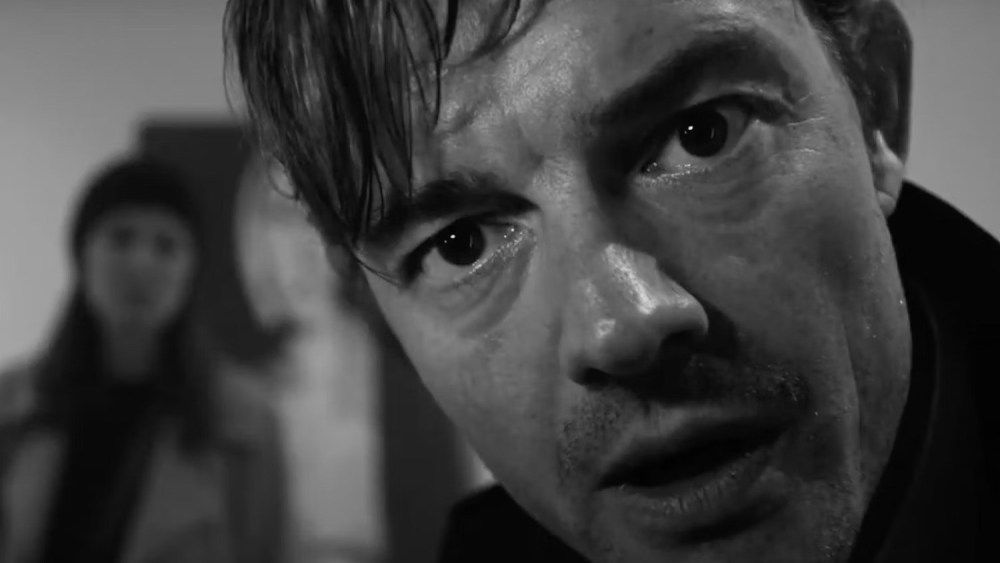Predicting Ben Wheatley‘s next career move is never a game to bet the house on. Two years after bouncing back from his impersonal, Netflix-glossy “Rebecca” remake with the gnarly indie eco-horror “In the Earth,” the British filmmaker was handed his biggest studio budget and least typical assignment to date with 2023’s sharkbuster sequel “Meg 2: The Trench” — a dud, most agreed. So what now? The most stubbornly anti-commercial film of his career, of course. Shot on a shoestring and seemingly written on the back of envelope that then went several rounds in the shredder, “Bulk” is a stunt that makes even earlier oddball Wheatley works like “A Field in England” look quite conventional by comparison — but there’s more energy and wit in this hybrid of conspiracy thriller, time-bending sci-fi and goofy genre parody than we’ve seen from the director in a while.
Unveiled at the Edinburgh Film Festival as the opener of the Midnight Madness section, “Bulk” serves as something of a palate cleanser for Wheatley’s next film, the Bob Odenkirk-starring thriller “Normal” — which premieres next month in Toronto’s midnight program, and will surely overshadow this microbudget curio in the distribution stakes. But genuine, proudly niche cult status could await “Bulk,” the kind of jumbled pizza-dream vision that feels like something stumbled upon in the early hours on some rogue TV station: Even viewers watching from the outset may wonder if they’ve somehow tuned in halfway.
The narrative is more or less beside the point — or on top of it, below it, above it, floating all around it, given that it unfolds in an multiverse so infinitely fragmented as to make the MCU look tidily linear. In some compartment of it, oligarch tech whiz Anton Chambers (Mark Monero) has conducted a failed experiment in string theory, causing his enigmatic “brain collider” invention to explode, and Chambers to disappear with it. Dazed journalist Cory Harlan (Sam Riley) is kidnapped and enlisted to help retrieve him, with the arch, ultra-poised Aclima (Alexandra Maria Lara) as his identity-shifting warden.
If this is sounding halfway like a Christopher Nolan premise, it’s a deceptively straightforward description of a film that abounds in story tunnels and trapdoors, some metaphorical and some literally built into the outwardly unremarkable suburban house where Harlan is confined. A boxy living room opens into an apocalyptic battlefield; time can loop back on itself or hurtle disorientingly forward. “Don’t question the story out loud, it only undermines it,” Aclima instructs Harlan, and that’s the audience told too. In any event, he and we are assured that while the journey ahead may be complicated, it won’t be long. “90 minutes max,” she says. “Anything longer seems like an indulgence.” (No prizes for guessing the film’s precise running time.)
Such metatextual quips abound in “Bulk,” a film that is about nothing so much as its own diverse tapestry of influences, from the handmade whimsy of vintage British TV series “Thunderbirds” to the opaquely minimalist sci-fi world-building of Godard’s “Alphaville” to the luridly cranked-up paranoia of midcentury B-movies like “The Quatermass Experiment.” Wheatley isn’t just briskly checking off reference points, however, but devotedly recreating their tropes and aesthetics. Shot mostly in inky monochrome by his “In the Earth” DP Nick Gillespie, the film ricochets from sleek, high-contrast noir styling to lovingly artificial back projection to thumbprinted Harryhausen-style model-making — adding up to a disordered lookbook of genre styles and techniques from the last century or so, over a score heavy on plinky videogame-style synths, eerie bass drops and the occasional flat vocal interjection from Bill Nighy.
With his brow perennially furrowed and hair slicked with sweat, Riley has the exact look and bearing of a suavely addled wrong-man figure from British thrillers of yore — and thus makes a suitably bemused proxy for the viewers in this wasteland of mounting chaos and absurdity. His real-life wife Lara (reteaming with Riley and Wheatley after 2018’s “Happy New Year, Colin Burstead”) is a wonderfully deadpan counterpart, serenely in control of the madness until an endearing closing-credits gag. All involved appear to have had nearly as much fun making “Bulk” as Wheatley himself, which is an entirely reasonable amount; even when the film sinks into the abstruse, it thrives on a sense of mischief and play.

